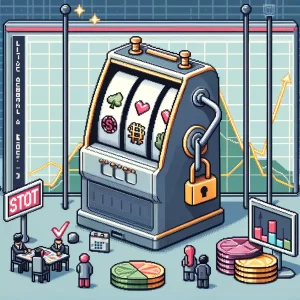
Gambling Ads in Our Daily Lives: More Harmful Than You Think
In today’s world, gambling ads are everywhere—on TV, social media, and even in our favorite sports. Gambling companies use precise data-driven methods to reach us, and they don’t just stop there. Personalized promotions target those who’ve gambled before, nudging them back into old habits. What does this mean for public health? Research says the impacts are serious. Gambling ads don’t just get people to try gambling—they increase risky behaviors, leading many down a harmful path.
The Data-Driven Marketing Trap
Marketing has changed. Gambling ads today are far more invasive than in the past, leveraging data, algorithms, and behavioral tricks to hook consumers. (and regular readers know how much I hate “data-driven”)
Ads often pop up just when people are most susceptible, enticing them to gamble more, gamble across multiple platforms, and even chase losses—behaviors that signal increasing risk. In fact, studies show that marketing spurs unplanned spending among both casual and frequent gamblers. By pushing consumers toward frequent and high-stakes betting, these ads create a culture where gambling is normalized, yet many of these strategies target people at their most vulnerable moments.
Why Waiting for “Proof” Is Dangerous
The gambling industry claims there’s no clear evidence that advertising directly causes gambling harm. But experts argue that the evidence is clear enough: more ads mean more gambling, which in turn means more harm. The conservative approach of waiting for undeniable proof leaves communities exposed to harm. Public health doesn’t rely on proof alone; it also considers risk factors and patterns that demand precautionary action. Insisting on a strict cause-and-effect relationship is a tactic borrowed from other harmful industries like tobacco, which used similar arguments to delay regulation. Gambling ads need restrictions to protect individuals, especially those already struggling with financial or mental health challenges.
The Problem with Self-Regulation
Currently, gambling companies are given the responsibility to self-regulate their advertising practices, with minimal oversight. This system assumes that these companies will act in the public interest. However, evidence shows that they often do the opposite, as they rely heavily on advertising to drive profits. The current regulations don’t address the reality of modern advertising methods, which are designed to maximize profits through frequent and highly targeted ads. This self-regulation approach has turned a blind eye to growing evidence of harm, allowing gambling to embed itself in the lives of millions.
Children and Young Adults: The Most Vulnerable
One of the most troubling aspects of today’s gambling ads is their impact on children and young adults. Research shows that young people are more likely to gamble when exposed to ads, and are especially vulnerable to online promotions. This early exposure normalizes gambling, embedding it in their lives as they grow older. Without stricter regulations, we’re raising a generation that sees gambling as a normal, everyday activity—while overlooking the real risks.
The Urgent Need for Policy Reform
The current policy framework is out-of-date and ineffective. It fails to address how ads target young people, exploit behavioral science and promote high-risk gambling. Public health experts are urging the government to adopt a more proactive stance, similar to regulations seen in other sectors. There are calls to:
- Limit data-driven marketing and personalized promotions that lure vulnerable people into risky behaviors.
- Ban or restrict promotions that drive excessive spending, such as free bets and bonuses.
- Address the role of sponsorship in sports, which links gambling with social and cultural activities. These actions could help curb the reach and influence of gambling ads and protect at-risk groups, including children and people with existing mental health issues.
A Public Health Issue, Not Just a Private Choice
Gambling harm goes beyond individual choice. It affects families, communities, and society at large. When someone struggles with gambling addiction, it’s often those around them who suffer as well. Gambling ads fuel an industry that profits from people’s losses, often leaving them with significant financial and emotional costs. While gambling companies claim they’re promoting a harmless pastime, the truth is that for many, gambling becomes a trap. We need policies that protect everyone, ensuring that gambling is permitted but not promoted in harmful ways.
Join the Conversation
What do you think of the impact of gambling ads on public health? Should we implement stricter advertising regulations? Share your thoughts in the comments or on social media. Let’s discuss how we can protect our communities from the hidden harms of gambling.
Be Part of the Change – Get Weekly Updates!
Stay informed and connected. Subscribe for free and share this blog to make a difference in public health with others. If you liked this blog, please share it! Your referrals help This Week in Public Health reach new readers.



